

Besoin d'aide?demander une soumission
 Imprimer
Imprimer
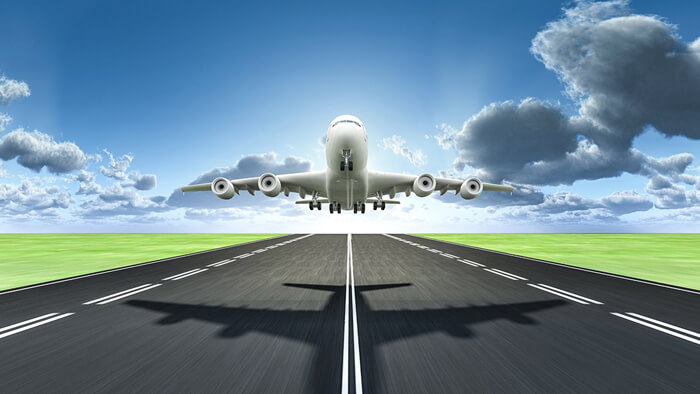
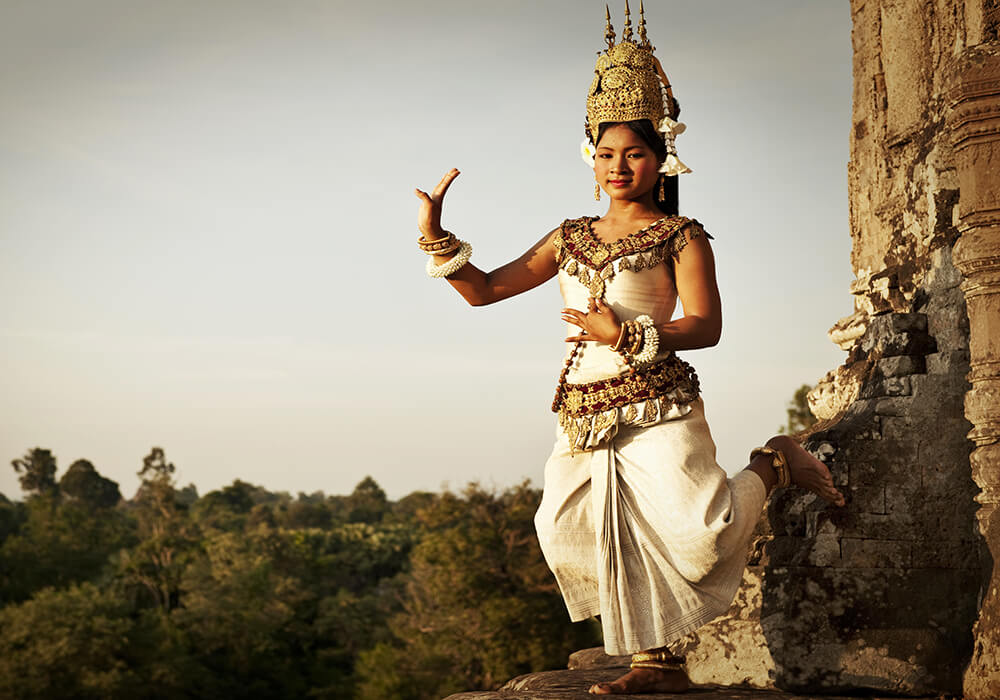
Departing from your home city, we will take the overnight flight to Cambodia
 Flight
Flight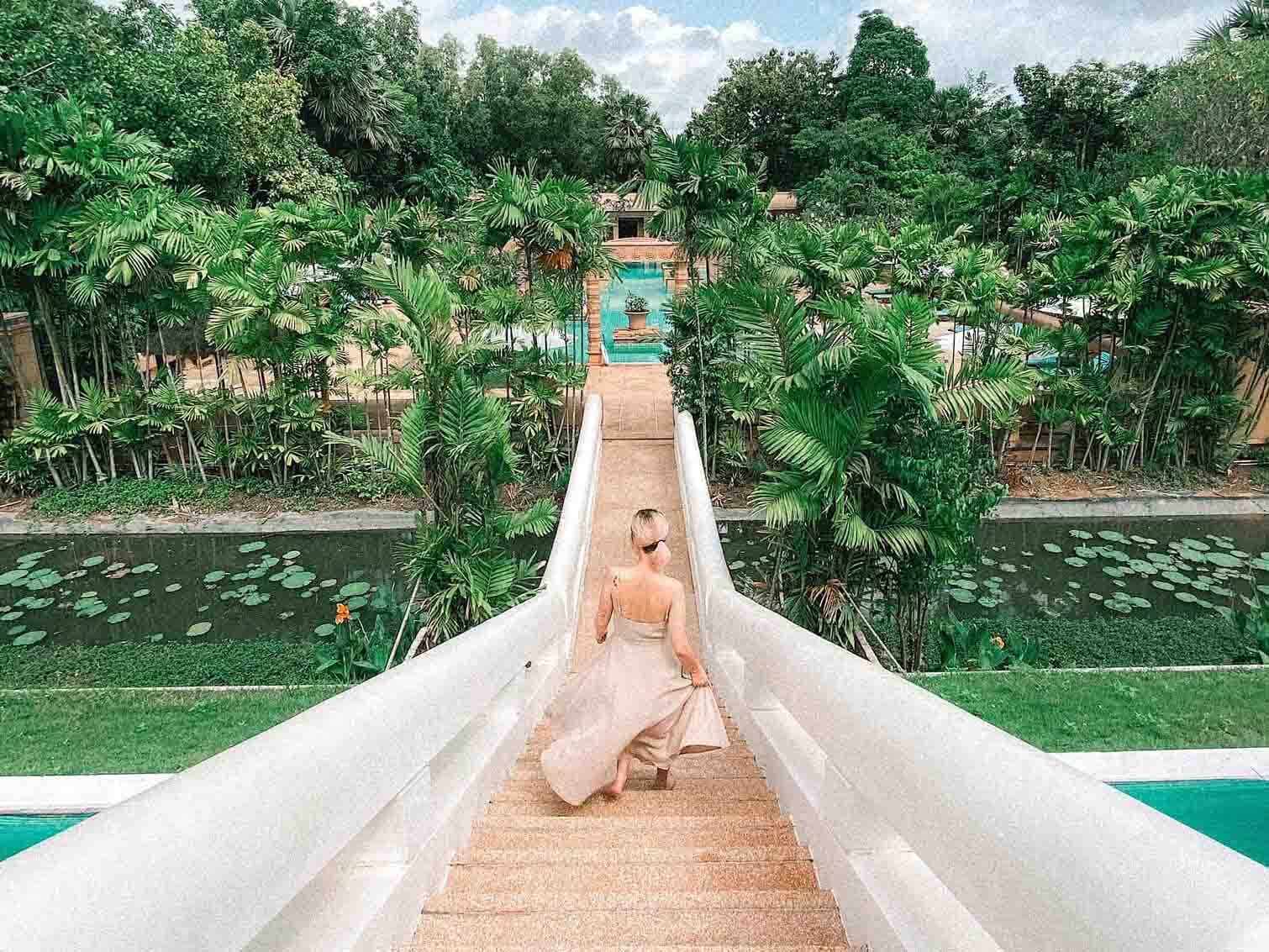

After arriving in Siem Reap, transfer to the hotel。
 Le Meridien Angkor or similar (5 stars)
Le Meridien Angkor or similar (5 stars) bus
bus

After breakfast, we will spend a full day visiting the majestic gates of Angkor Thom, the monumental temple of Bayon where we will climb up its towers to gain an overall view of the tropical forest, the Baphuon and Phimeanakas mountain temples, and the terraces of the Elephants and the Leper King. We will have lunch at a local restaurant. In the afternoon, we’ll continue our visit of the temple of Angkor Wat, a marvel of balance and architectural perfection.
 Le Meridien Angkor or similar (5 stars)
Le Meridien Angkor or similar (5 stars) Breakfast/Lunch/Dinner
Breakfast/Lunch/Dinner bus
bus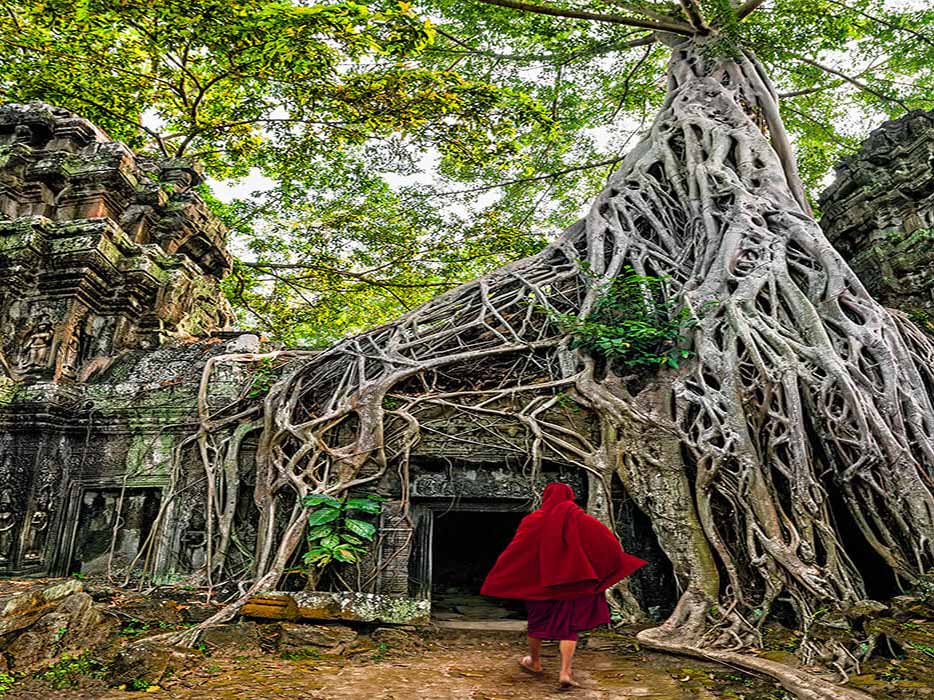

After breakfast at the hotel, we will continue our visit of Angkor from the charming Banteay Srei, the apogee of classical Khmer art decorated with superb pink sandstone bas-reliefs. In the afternoon, discover the immense maze of Preah Khan, the charming Neak Pan and the mysterious Ta Prohm invaded by the sprawling roots of cheese trees
 Le Meridien Angkor or similar (5 stars)
Le Meridien Angkor or similar (5 stars) Breakfast/Lunch
Breakfast/Lunch bus
bus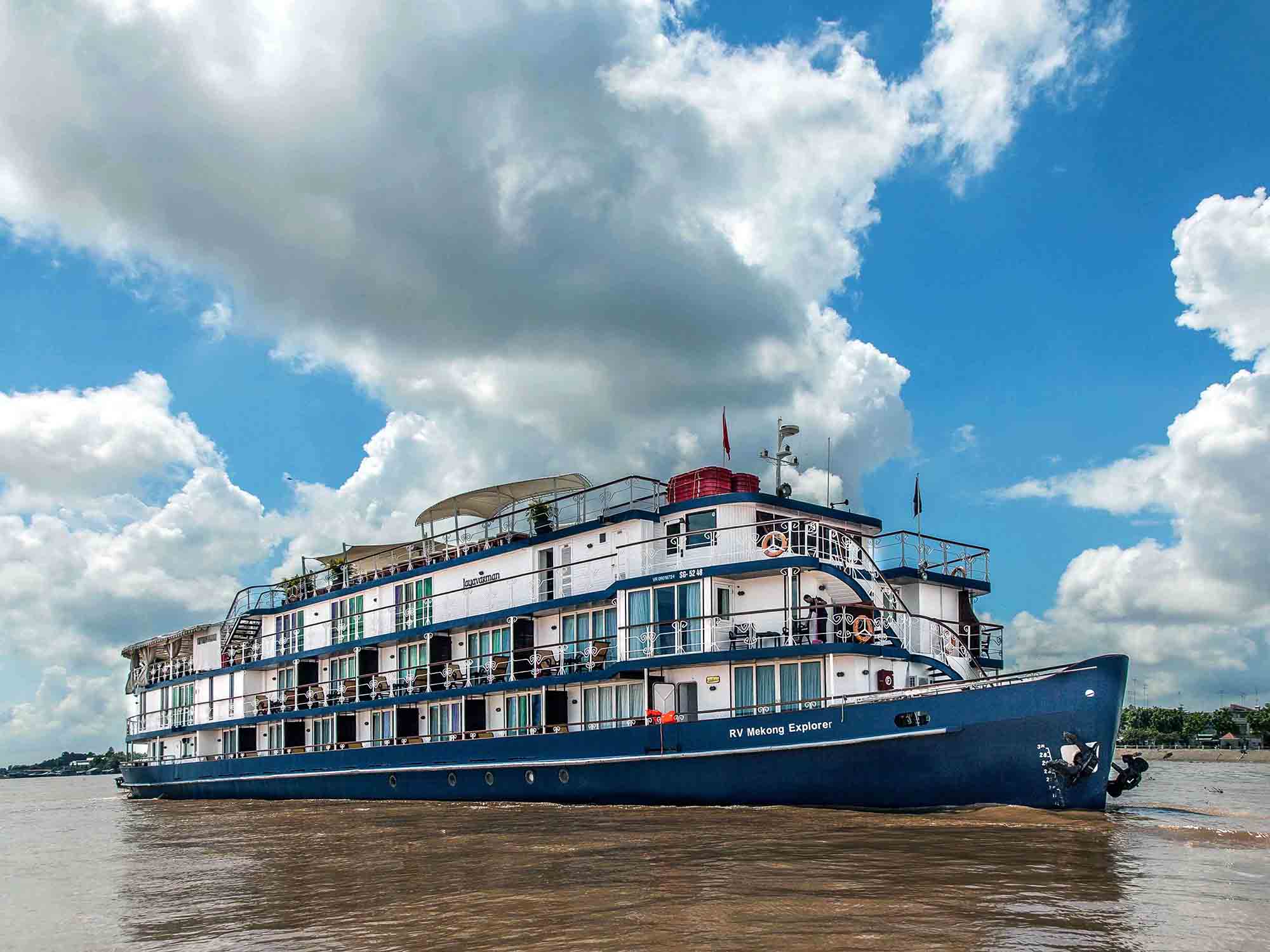
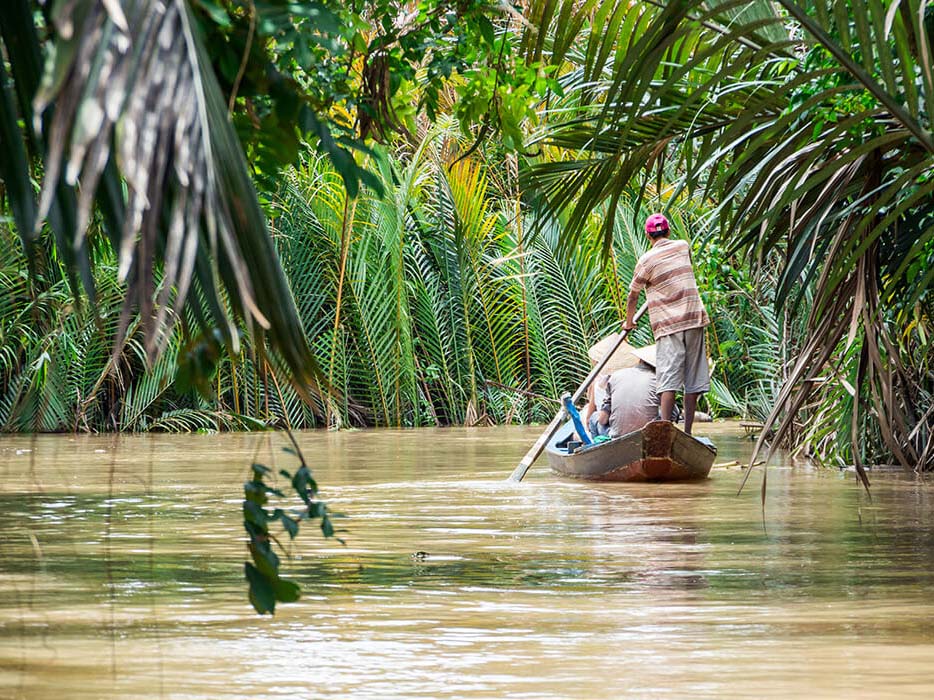
After breakfast,transfer to town of Kampong Cham, where the ship awaits us (approximately 4.5 hrs transfer time including rest stop) ,When moving into your staterooms upon boarding, your first inclination might be to step on your balcony to watch the ship set sail for a southbound journey on the mighty Mekong.This afternoon ,we prepare to leave the ship for a bus excursion to a nearby spectacle only present during the Mekong’s low water season (December to May). The Koh Paen Bamboo Bridge connects the mainland with Koh Paen Island and is re-built by the local community every November when water levels drop.Continue our land journey to the enchanting pre-Angkorian temple of Wat Hanchey (7th century). Formerly built to honor the Hindu god, Hirahara, the complex is now a Buddhist temple, a testament to the country’s past and present religious’ beliefs.
 Mekong River Cruise: Heritage line Jayavarman (5 stars)
Mekong River Cruise: Heritage line Jayavarman (5 stars) Breakfast/Lunch/Dinner
Breakfast/Lunch/Dinner Cruise
Cruise
Wake up early to witness the spectacular scenery at the break of dawn. To make the experience complete, join our daily morning Tai Chi class. Afterwards, a rich breakfast buffet awaits, or if you prefer, we can serve breakfast directly to your room.Today, the small village of Angkor Ban is our first destination. The village is famous for its unspoiled community and beautiful, traditional houses. It feels like being transported back a hundred years, into an era unaffected by modernity where villagers are characterized by their unbridled warmth. Back on board, a monks’ blessing ceremony delivers spirits and wishes for health and prosperity for us all. While we sail downstream, afternoon tea is offered at the bar. Our staff is keen to show you a variety of traditional Khmer fashion the local people still wear on special occasions. Conversely, the ubiquitous Cambodian scarf, the Krama, is a garment worn by people of all ages and walks of life. This multi-functional attire is worn not just around the neck, but also as a bandanna, facemask, belt, swimwear, and even as a hammock to carry children.Meanwhile we arrive at the island of Koh Oknha Tey. This spot in the middle of the Mekong owes its fame to manufacturing high-class silk products. We go sightseeing along the island’s roads a bit via tuk tuk before arriving at the village’s workshops and witnessing the curious process of making silk, starting from a tiny silkworm larva to cocoon, then dyeing, spinning and weaving the fibres into high-quality Cambodian silk.
 Mekong River Cruise: Heritage line Jayavarman (5 stars)
Mekong River Cruise: Heritage line Jayavarman (5 stars) Breakfast/Lunch/Dinner
Breakfast/Lunch/Dinner Cruise
Cruise
After a sumptuous breakfast, we are now at Kampong Chhnang, Cambodia’s “water world”, where everything is balanced on sticks in water-rich soil. It is perhaps the most fascinating cruising spot in Cambodia. We take a local boat to the shore and hop on a mini bus to reach a quite unique, nearby rural village. As we explore the village on foot our guide reveals the village’s specialties – Khmer style pottery and the process of making of palm sugar from the Cambodian “skor t’not” palm tree.We drive back to the shore where our local boat starts an exploration of nearby floating villages and the surrounding wetlands. Although we are still in the heartland of Cambodia, the residents of these floating villages are actually of Vietnamese descent who were expelled by the Khmer Rouge and soon returned after the ruling party was overthrown in 1979. No longer having land to settle on, they have since lived “on the water”. We are in the middle of Cambodia’s countryside where – surprise – traditional ox carts are still a common means of transportation. Our ox-powered vehicle takes us on a journey along the riverside and through back roads lined with rice-paddy fields until we arrive at a tiny village. Beginning a few short years ago, local children have had the chance to receive an education here. The “Green School” is a local project supported by Heritage Line in this remote area to support the underprivileged youth. The students, who are dressed in green shirts, are always happy to meet us every week as the principal gives an introduction and updates us on the current situation of the school.After some additional cruising time back aboard, the boat arrives and docks at the pier of Phnom Penh. Feel free to go out and explore by yourself after dinner. Stroll along the river promenade and watch the locals chit-chatting, selling odds and ends or have a drink in one of the numerous bars.
 Mekong River Cruise: Heritage line Jayavarman (5 stars)
Mekong River Cruise: Heritage line Jayavarman (5 stars) Breakfast/Lunch/Dinner
Breakfast/Lunch/Dinner Cruise
Cruise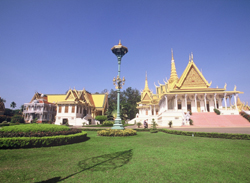

Welcome to Phnom Penh - the city once named Paris of the East. Despite its rapid development, it has retained its rustic charm and elegance. It is an amazing town with centuries of incredible history and culture which can still be felt at many street corners. We start with a full sight-seeing tour right after breakfast. By bus, we visit the Killing Fields outside the city and afterwards the centrally located prison “S21”. Both historic sites display the sad and cruel chapter of the country’s history when the Khmer Rouge ruled Cambodia with terror and oppression. Those places have not changed much since this horrific time back in the early seventies and it can be quite heart-breaking. Alternatively, you may explore the city on your own in the morning before re-joining the group. We have a lunch at a well-renowned restaurant in town and experience the elegant air Phnom Penh’s top addresses are known for. Our exploration of Phnom Penh continues with the cultural highlights of the city’s heritage. The golden edifice of the Royal Palace with its Silver Pagoda and the exceptional Khmer crafts at the National Museum top the list of the city’s must-sees. The day trip ends with a “cyclo” ride along the bustling streets of downtown Phnom Penh and back to the ship.Take some rest or join fellow passengers at the bar for refreshing drinks. Today’s evening is a special one: let us invite you to a wonderful open air gala featuring a barbecue dinner feast. The dinner is accompanied by a classic Apsara dance performance along with other folklore dances.
 Mekong River Cruise: Heritage line Jayavarman (5 stars)
Mekong River Cruise: Heritage line Jayavarman (5 stars) Breakfast/Lunch/Dinner
Breakfast/Lunch/Dinner Cruise
Cruise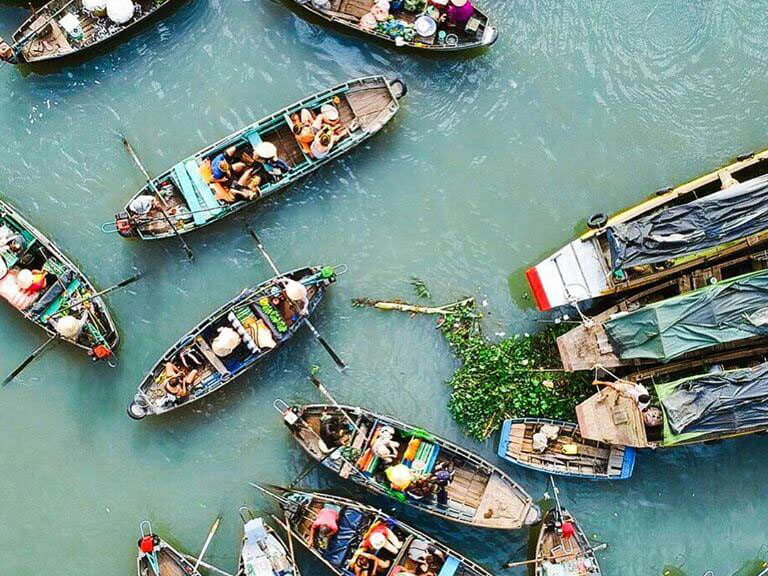
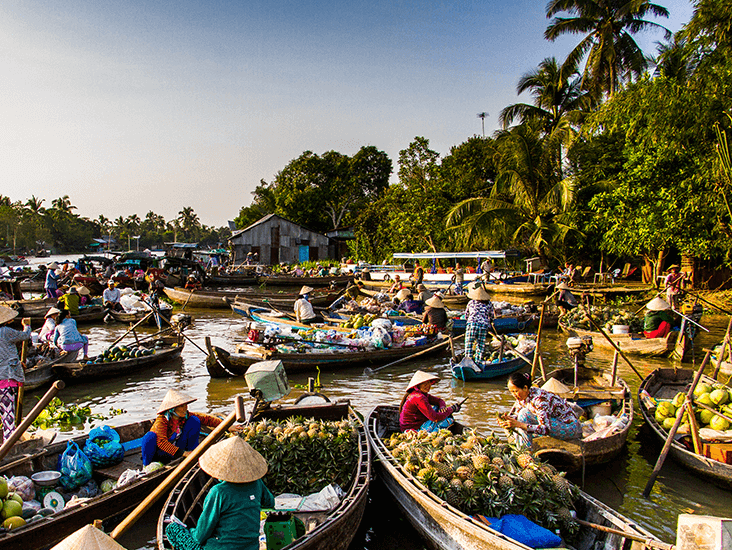
The rest of the morning and the whole afternoon is at your own disposal. As you sip drinks and nibble on treats during afternoon tea, we approach the border and finally arrive in Vietnam. From here it is just a short distance to Tan Chau, a pleasant, slow-paced border town with a sizeable Chinese, Kinh and Khmer community. We moor near the city with views on the riverbanks.
 Mekong River Cruise: Heritage line Jayavarman (5 stars)
Mekong River Cruise: Heritage line Jayavarman (5 stars) Breakfast/Lunch/Dinner
Breakfast/Lunch/Dinner Cruise
Cruise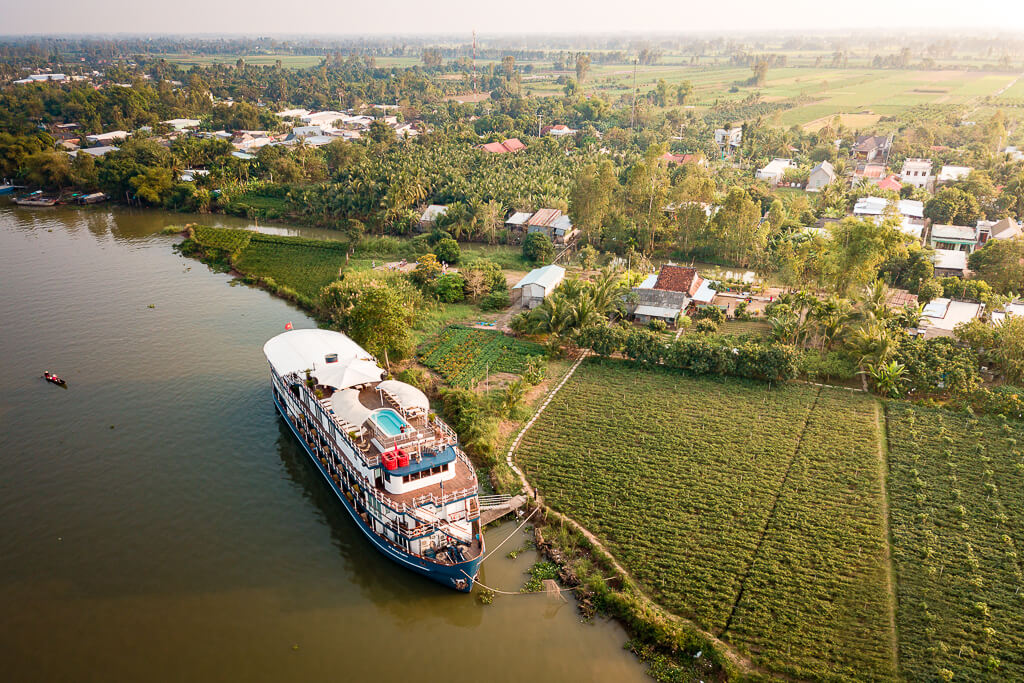
Once arrived on-shore, we hop on “xelois” to see Tan Chau’s vibrant town-life. A “xeloi” is a local vehicle which is still used as a taxi in this area. Your personal xeloi driver slowly navigates through the streets to observe all the workshops, houses and shops while feeling the laid-back vibe of this place. We stop at the colourful, local market near one of the town’s temples. This is a great opportunity to interact with the vendors of this friendly town and try your hand at bargaining with them. To see what Tan Chau is famous for, we board local boats and head to a floating fish farm. You are about to get an exclusive look into the world’s largest inland aquaculture industry. Each of the floating structures has netting hanging down into the water to enclose the fish, which are raised and fed on a daily basis. The region’s specialties are tilapia and the Basa catfish, or Pangasius, which is unique to the Mekong River basin and rapidly gaining popularity on the international seafood market. My An Hung Village is a wonderful example of a real local village in the Mekong Delta. Time stands still here and we receive wonderful insights into the private household of a local family and visit the seasonal vegetable fields to see what they are currently cultivating. We are invited to their house for a Vietnamese tea tasting. Vietnamese tea is often bitter, so locals sweeten it with honey, a regional delicacy also produced by our hosts. The family then presents a huge variety of fruits growing in the delta, freshly cut from the tree. And as an artist group performs a traditional, artistic dragon dance, we snack on these “vitamins bombs”.
 Mekong River Cruise: Heritage line Jayavarman (5 stars)
Mekong River Cruise: Heritage line Jayavarman (5 stars) Breakfast/Lunch/Dinner
Breakfast/Lunch/Dinner Cruise
Cruise
This morning the vessel arrives at one of the larger islands in the vast stream of the Mekong, Binh Thanh Island. Several communities have settled here and make their living by growing water hyacinths. We exclusively visit one of these untouched areas. By wandering through the village, we get a deep understanding of native life. One of the local artisans, for example, demonstrates the entire process of traditional mat making. You can try weaving yourself. We also meet a local elderly couple who share their story of living on this island. They are always happy to chit-chat with our guests. Back on the ship lunch is served and we sail towards Cai Be. Cai Be is a charming town which is famous for its Catholic French church and the manufacturing of traditional crafts and food products. The once enormous floating market of Cai Be gets smaller year by year since trading on the water is continually shifting towards modern markets. However, you can still see boat-to-boat trading of local goods, such as fruits and agricultural products and imagine what this must have looked like on a larger scale. We learn from our guide about the long-lasting trading culture and how each boat has a special marker to let buyers know what goods they are selling.By local boat, we sail along the green canal network and watch the farmers working in the fields. A visit ashore of a workshop shows us the manufacturing of rice paste, rice paper, rice cookies and rice wine. Cai Be’s surrounding areas are covered by palm trees, which is why the region is also famous for the production of coconut candy. Back on board our crew invites you to a farewell event and to enjoy some cheerful moments before dinner, including music and Cambodian dancing together with the team. Savour your final dinner aboard and relive the week’s adventures in your mind’s eye with a glass of wine at the open bar.
 Mekong River Cruise: Heritage line Jayavarman (5 stars)
Mekong River Cruise: Heritage line Jayavarman (5 stars) Breakfast/Lunch/Dinner
Breakfast/Lunch/Dinner Cruise
Cruise

Enjoy your last breakfast aboard your floating home. We disembark the ship after breakfast and take a bus transfer from My Tho to Saigon. It is only around 70 kilometres on the highway, and you arrive in Saigon by mid-morning. Transfer to hotel and free time in the afternoon
 InterContinental Asiana Saigon or similar (5 stars)
InterContinental Asiana Saigon or similar (5 stars) Breakfast/Lunch
Breakfast/Lunch bus
bus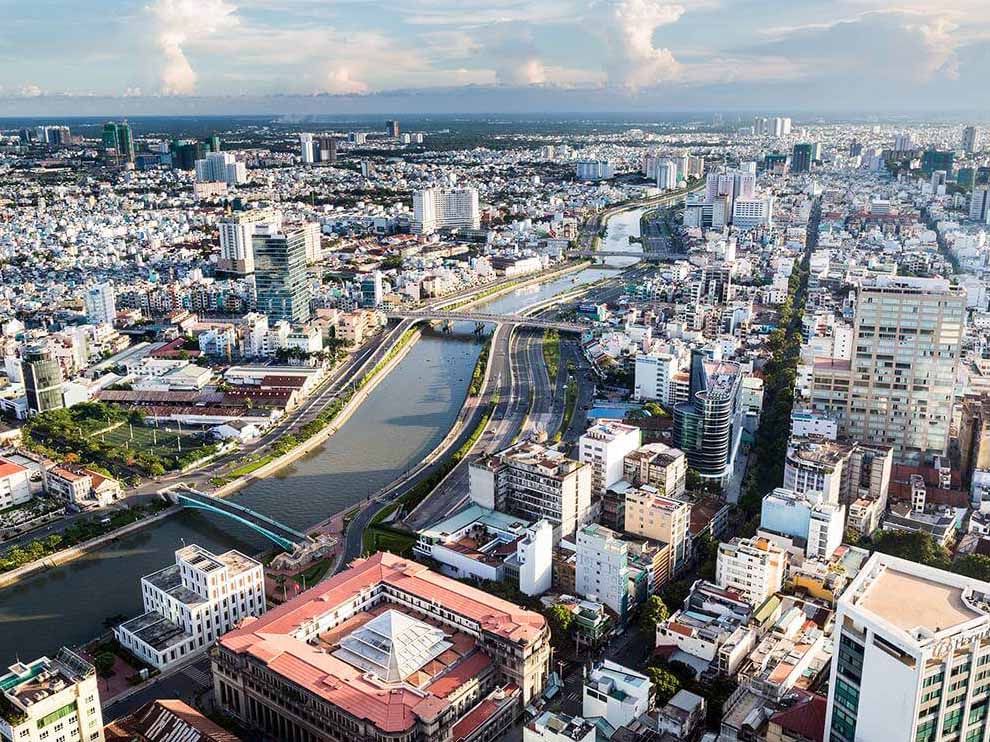

After breakfast, we will have time to discover the country's economic capital and visit the old colonial residential districts where we can visit the Town Hall, the Opera House, the Notre-Dame Cathedral built in the 19th century, and take a stroll near the magnificent central station. In the afternoon, discover the Chinese district "Cho Lon" and its impressive Binh Tay market.End your day with a visit to a lacquer factory.
 InterContinental Asiana Saigon or similar (5 stars)
InterContinental Asiana Saigon or similar (5 stars) Breakfast/Lunch
Breakfast/Lunch bus
bus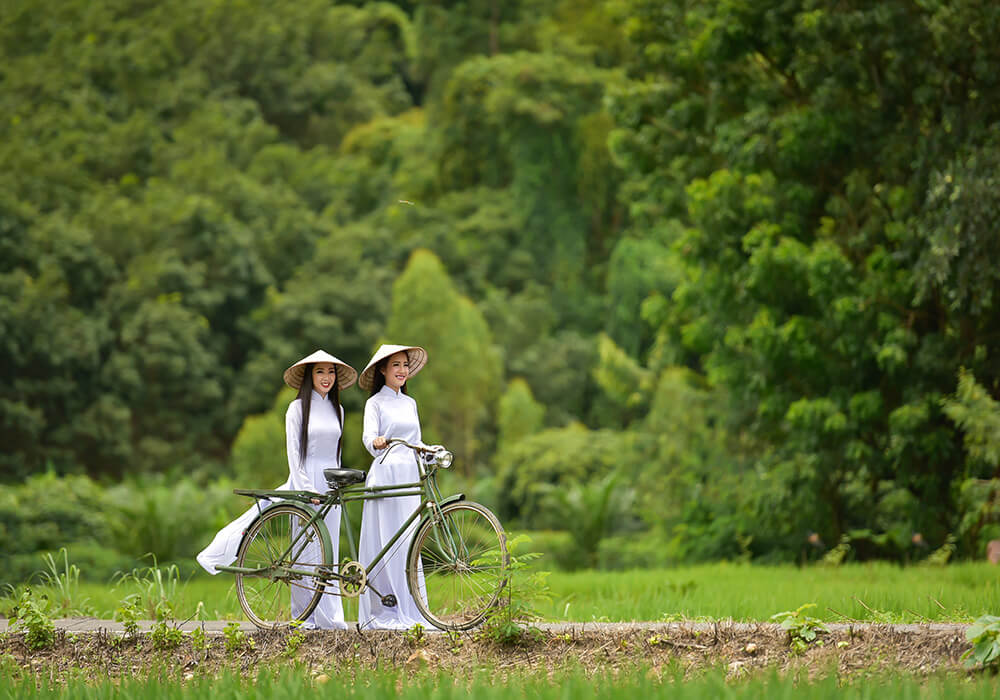
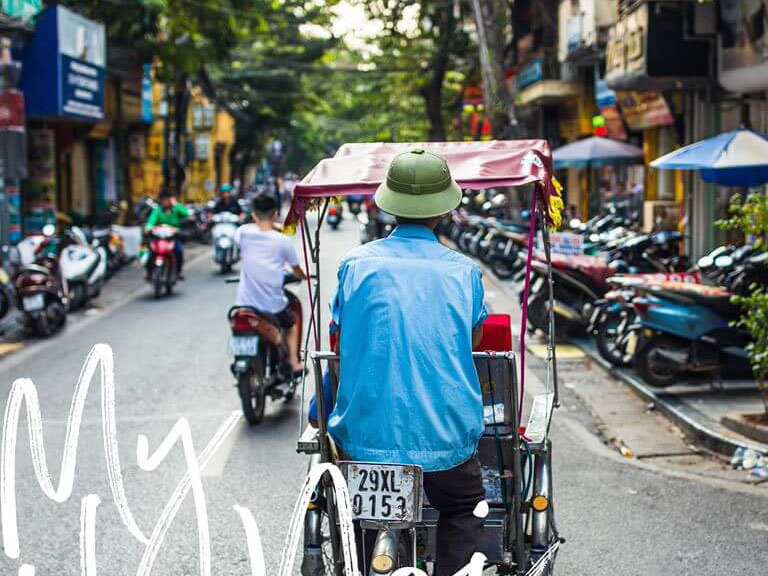
After breakfast, fly to Hanoi, we will visit the Ho Chi Minh Mausoleum and the One Pillar Pagoda. Then visit the Temple of Literature, In the afternoon, visit the Vietnam Museum of Ethnology Hoan Kiem Lake.At the end of the day, visit the Ngoc Son Temple , old districts. We will attend a water puppetry show, and have dinner at a local restaurant.
 Sofitel Legend Metropole hotel or similar (5 stars)
Sofitel Legend Metropole hotel or similar (5 stars) Breakfast/Lunch/Dinner
Breakfast/Lunch/Dinner Flight
Flight

After breakfast,transfer by bus to Halong Bay. Board a junk boat for a memorable cruise ride in the mythical Halong Bay. Passing by beautiful landscapes such as Cho Da Islet (Stone Dog Islet), Fighting Cocks Islet, the fishing village of Halong and Dinh Huong Islet (Incense Burner Islet), enjoy a beautiful panoramic view of Halong Bay.
 Vinpearl Resort & Spa Ha Long or similar (5 stars)
Vinpearl Resort & Spa Ha Long or similar (5 stars) Breakfast/Lunch/Dinner
Breakfast/Lunch/Dinner bus
bus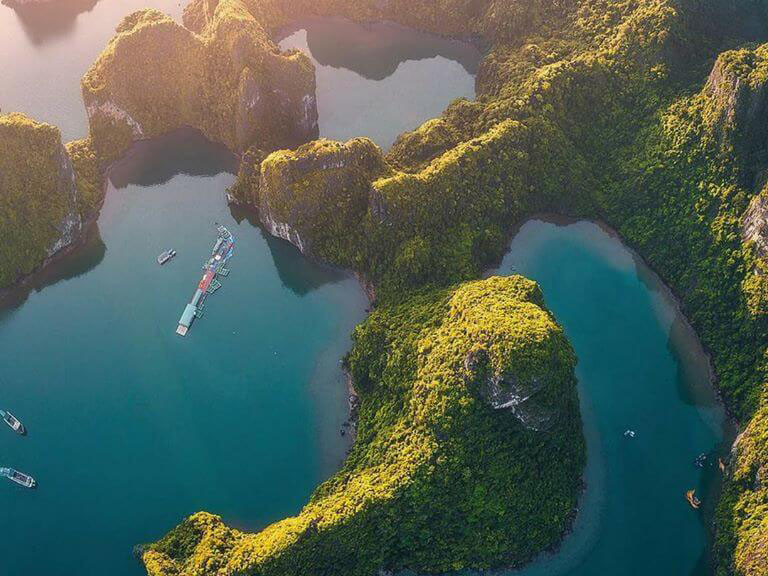
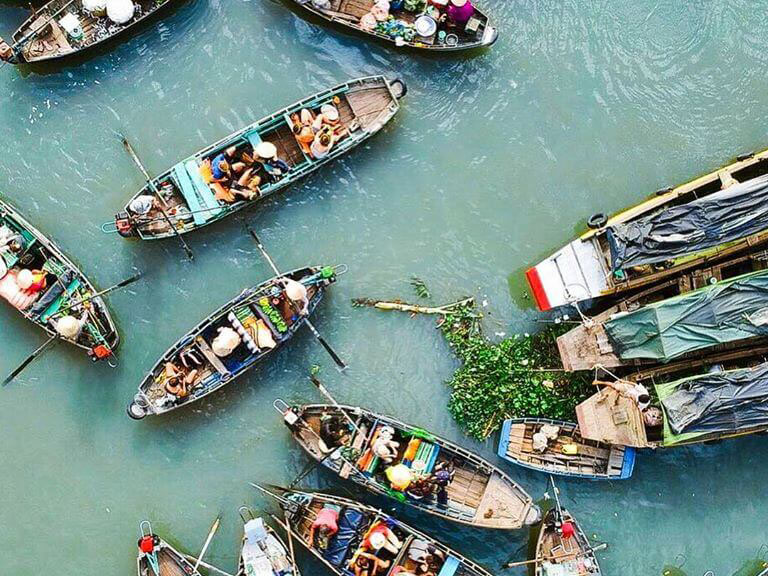
After breakfast, we will head back to Hanoi, and arrive in the late afternoon. Free time to experience the local life. We will spend the night in Hanoi.
 Sofitel Legend Metropole hotel or similar (5 stars)
Sofitel Legend Metropole hotel or similar (5 stars) Breakfast/Lunch/Dinner
Breakfast/Lunch/Dinner bus
bus

After breakfast , transfer to airport and back to home city, end of the trip.
 Breakfast
Breakfast Flight
Flight
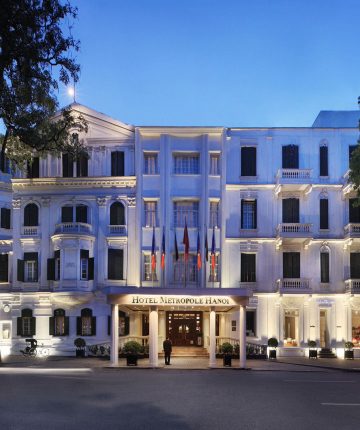



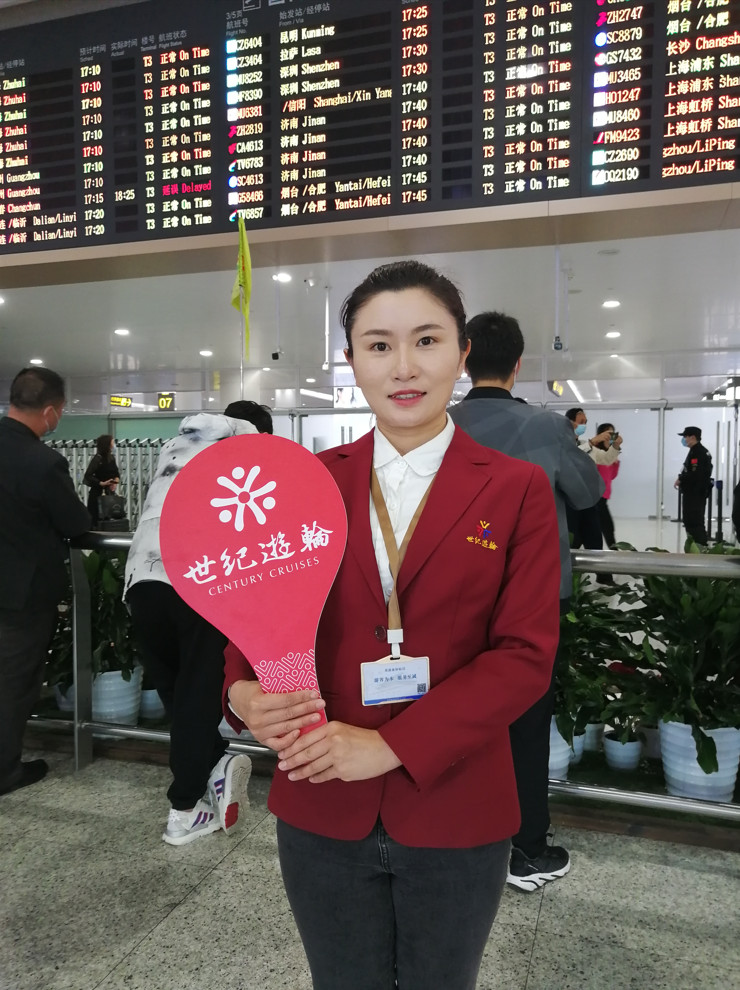
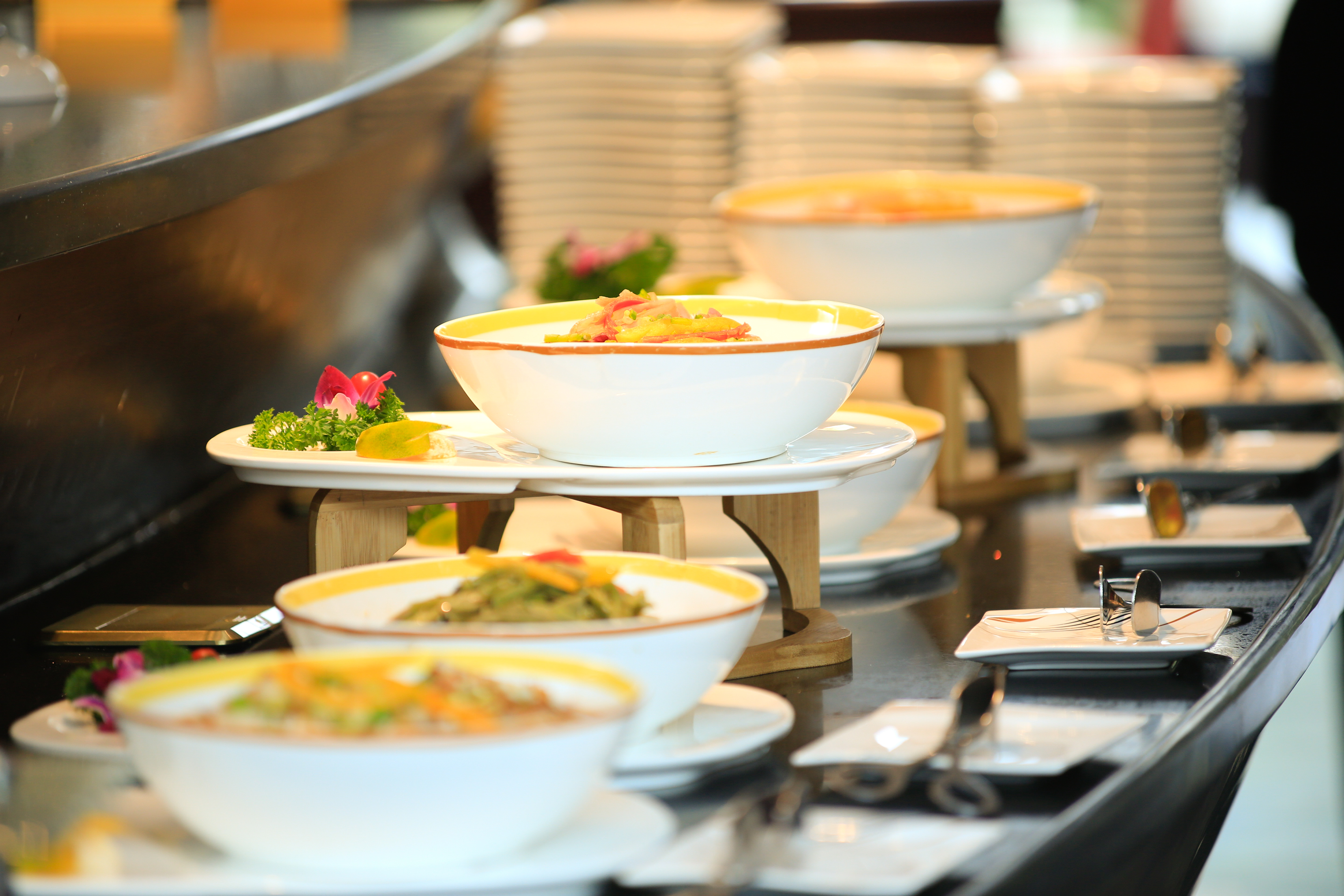




There are more than 20 nonimmigrant visa types for people traveling to the United States temporarily. There are many more types of immigrant visas for those coming to live permanently in the United States. The type of Visa you need is determined by the purpose of your intended travel. For an overview of visa types, please see Types of Visas for Temporary Visitors or Visa Types for Immigrants.
If your passport with your admission stamp or paper Form I-94 are lost or stolen, you must get them replaced immediately. There are a number of steps you need to take, learn more, see Lost and Stolen Passports, Visas, and Form I-94s.
As of 12:01AM ET on June 12, 2022, Traveler will no longer be required air passengers traveling from a foreign country to the United States to show a negative COVID-19 viral test or documentation of recovery from COVID-19 or proof of Covid-19 vaccination and no need to require to wear a mask before board the flight.
 +1 ( 805 ) 609 - 6090
+1 ( 805 ) 609 - 6090 [email protected]
[email protected]
WeChat Official Account